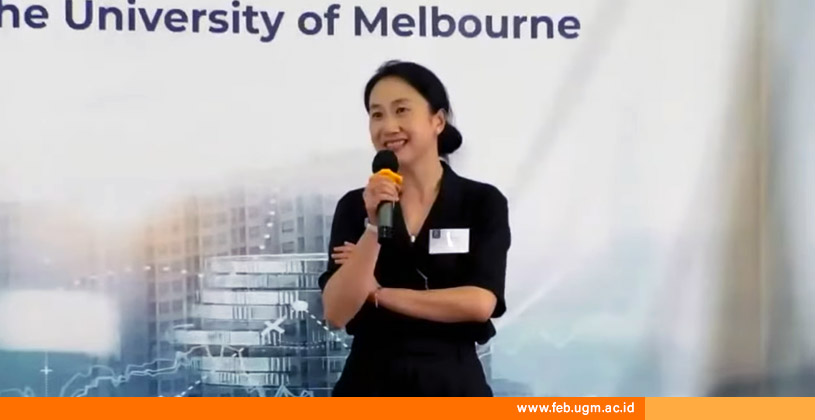The new world of finance requires fundamental knowledge and application of technology to conduct financial transactions efficiently and effectively
- Details
- Written by Hayfaza
- Category: News
- Hits: 772

Master of Business Administration Study Program, Faculty of Economics and Business Universitas Gadjah Mada (FEB UGM) Jakarta Campus held a Guest Lecture with the topic "The Modern World of Finance". The lecture began by singing the anthem Indonesia Raya, followed by remarks from the Head of the MBA Study Program FEB UGM Jakarta Campus, Prof., Dr., Eduardus Tandelilin, M.B.A. This lecture was moderated by Maxensius Trisambodo, PHD. This lecture invited speakers: Associate Professor Andrea Lu, Lecturer in Finance, Faculty of Business and Economics University of Melbourne as well as Vice President of Financial Research Network Women (FIRN Women).
Andrea Starts by simplifying financial decision making, based on income and expenses. In a case, Mr. S has income of $10 and expenses of $7 while Mr. B has an income of $2 and an expense of $5. In finance, Mr. B can borrow cash from Mr. S with the intermediary of financial advisors and repay the loan at the time and interest they agreed upon. Both ended up happier, and that's the essence of finance, concluded Andrea. Andrea added that the each person in the society can become Mr. S or Mr. B at different point of times.
Andrea then elaborates the urgency of studying finance. Andrea explains about two factors that make learning finance challenging, namely: time and risk. Andrea also highlights the importance of understanding various financial instruments with different maturities and risks, such as loans, bonds, stocks, indices, insurance, foreign currencies, and many more. An understanding of the money market also needs to be understood because the sale and purchase of financial instruments requires an understanding of the money market. Andrea then explained about several ways to transfer funds. The first way is direct financing. In direct financing, the seller can issue the instrument and directly and sell it to the buyer without an intermediary. In direct financing, financial services can facilitate, for example, with financial advisors, investment banks, and stockbrokers. However, there are several problems in the application of direct financing including: the difficulty of finding partners due to differences in reference denominations, maturity, and risk. Meanwhile, for indirect financing, intermediaries are needed with benefits in the form of economies of scale, cheaper transaction costs, better information and others.
Andrea Lu also explained the importance of facilitating the flow of financing by the government and financial institutions. Because the facility will provide provision of information, risk management, efficiency, and public trust. At the end of the presentation, Andrea Lu explained the difference between “The Old World of Finance” and “The Modern World of Finance”. In the old world of finance, transactions revolved around gold and silver transactions and the physical recording of debt and stock. Debt transactions were first recorded in 3000 BC in the Somerian civilization, while stock transactions were first recorded at the end of the 13th century in Bruges at the "Burgse Beurse" meeting. Moving into the modern world, there are now new financial market commodities such as Cryptocurrencies with blockchain technology, Crowdfunding, and Pay Later on mobile applications. The modern world of finance requires in-depth fundamental knowledge and the application of technology to conduct financial transactions efficiently and effectively, in other words strengthening financial technology (fintech). Andrea concludes that finance is not a zero-sum game. Finance revolves around moving financial assets to better use, as well as maximizing the efficiency of surplus between economic units. Before proceeding to the question and answer session, Prof. Andrea Lu closes the lecture with a quote from Professor Robert Shiller: “Not a single endeavor can be done alone as an individual, without an organization and without resources…Every valuable activity is interconnected..”
Reportage: Hayfaza Nayottama


